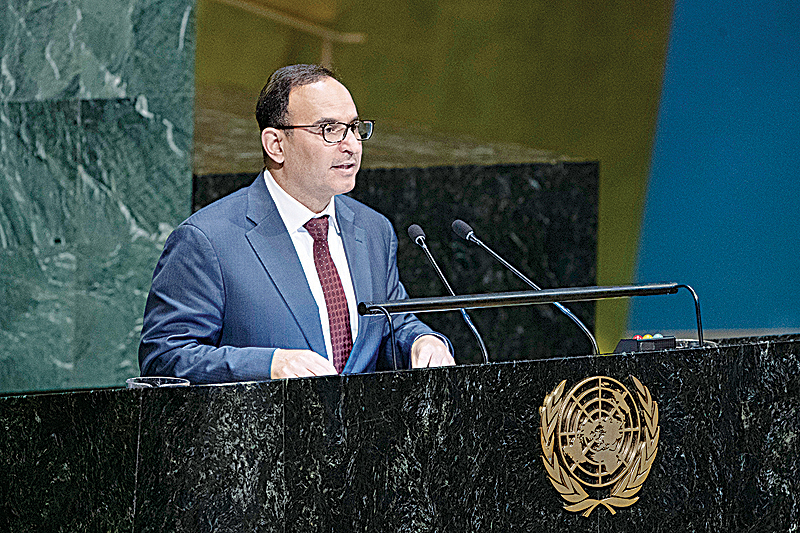Kuwait reiterates UNSC unity against sexual violence in conflict
NEW YORK: Unless justice is served and crime perpetrators prosecuted, a sustainable and inclusive peace could not be achieved in Syria, Kuwait said. The remark was made by Kuwait's Permanent Representative to the UN Ambassador Mansour Al-Otaibi late Tuesday, during a UN General Assembly session on international, impartial and independent mechanism to assist in the investigation and prosecution of persons responsible for the most serious crimes under international law committed in the Syrian Arab Republic since March 2011. It is more commonly referred to as 'the Mechanism,' or 'IIIM.'
"As the crisis enters its ninth year, the absence of accountability for those who committed crimes in Syria since March 2011 continues," he pointed out. He further said that some of those heinous acts could live up to the status of "war crimes," or "crimes against humanity," including the ones of alleged use of internationally-banned chemical weapons. Kuwait, out of its global and moral beliefs, had adopted the establishment of IIIM, even voluntarily contributing to the Mechanism's financial budget, Otaibi noted. The only solution to the Syrian crisis could only be a peaceful one, based on the execution of UNSC resolution 2254 and the Geneva II Conference on Syria 2012, he concluded. The IIIM is neither a prosecutor's office nor a court, but collects and analyses information and evidence of international crimes committed in Syria to assist criminal proceedings in national, regional or international courts or tribunals that have or may in the future have jurisdiction over these crimes.

Sexual violence
Separately, Kuwait said it is significant for the international community in general, and the UN Security Council (UNSC) in particular, to remain united in tackling sexual violence in conflict, Kuwait's permanent representative at the UN said. "Undoubtedly, our principles are one and the same in view of condemning all forms of sexual violence, particularly those committed during conflicts," Otaibi said during a UN Security Council session on sexual violence in conflict. He called on the international community to seek together to put an end to sexual violence during conflicts and ensure justice to victims in a way that should observe the social and cultural considerations of all member states. He regretted that although the UNSC had adopted 10 years ago its Resolution 1820 stating that sexual violence in conflicts poses a threat to international peace and security and requires a serious international response, sexual violence cases have been growing.
Such crimes are mostly used as intimidation tools and war tactics to target specific communities on the basis of their ethnical, religious or political orientations with a view to forcing them to leave their homes and seizing their properties, he lamented. The Kuwaiti diplomat cited the forced displacement of Rohingya minority as a resonant paradigm in this regard, saying that forced displacement exposes victims, mainly women and girls, to sexual violence and human trafficking. Sexual violence crimes, in some flashpoints, are used by extremist groups, including the so-called Islamic State, as elements of political and terrorist economy, he pointed out. He emphasized that sexual violence in conflicts could be curtailed by means of bringing all those involved to accountability in line with local and international laws. He added that the UN Security Council has its own tools to fight sexual violence during conflicts, suggesting that it should reinforce peacekeeping and political missions targeting women empowerment during and following conflicts.
Sustainable peace
Bringing the criminals to justice is an integral part of sustainable peace since sexual violence affects the psychological and physical situations of victims, together with the whole society, Otaibi noted. He added that it is the responsibility of the States to provide protection to civilians during conflicts and to bring those involved in sexual violence to accountability. The UN Security Council has called upon warring parties around the globe to implement concrete commitments to fight what many speakers described as the heinous, barbaric and all-too-often silent phenomenon of sexual violence during conflict.
Adopting resolution 2467 (2019) by a vote of 13 in favor to none against, with 2 abstentions (China, Russian Federation), during a wide-ranging debate on the prevention and implications of sexual violence, the Council reiterated its demand for the complete cessation of all acts of sexual violence by all parties to armed conflict. The Council reiterated its deep concern that - despite its repeated condemnation of violence against women and children in situations of armed conflict, including sexual violence - the phenomenon continues to occur, often with impunity, and in some situations has become systematic and widespread, or reached appalling levels of brutality. - KUNA
.jpg)



